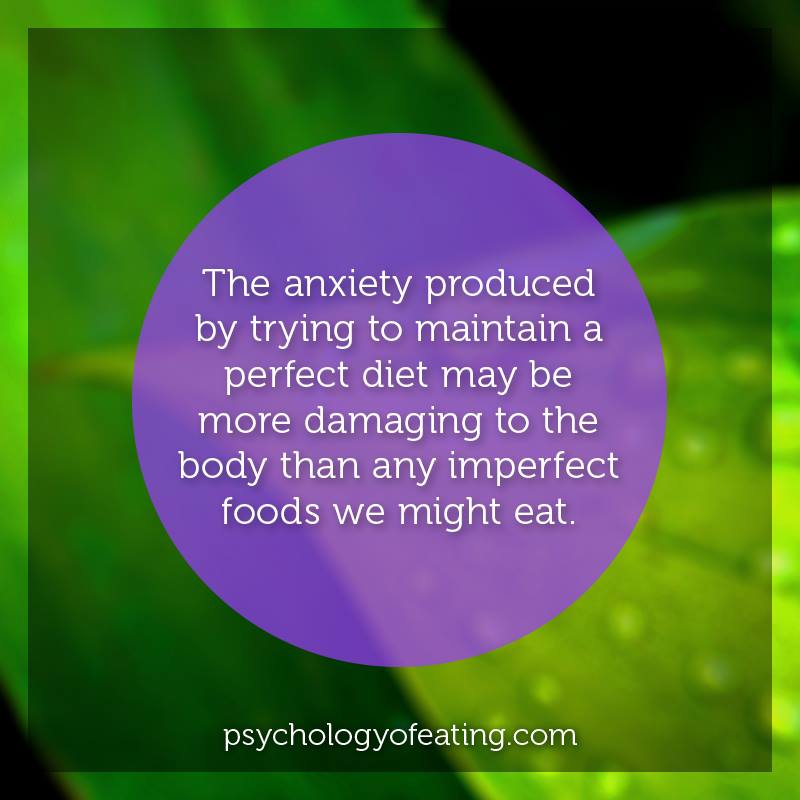 It wouldn’t be long before my fixation on what not to eat drove me right into the arms of said substance, chipping away at my self-trust and leaving me feeling powerless, discouraged and ashamed.
It wouldn’t be long before my fixation on what not to eat drove me right into the arms of said substance, chipping away at my self-trust and leaving me feeling powerless, discouraged and ashamed.
And to make matters worse, I beat myself up about my obsession. If only I could just stick to the right diet, then I could finally stop obsessing about food! Boy, did I have it all wrong.
The true pathway to recovering your headspace from food obsession is actually quite different.
So If thinking about food has become like a horrible part-time (or even full-time) job that sucks the life force out of you and pays you in self-doubt and heartache, here are 4 steps to break your preoccupation with food and reclaim your energy and attention for the stuff that would really nourish you:
Step 1: Accept what is.
To create any kind of change, you have to start where you are. OK, so you have been obsessing about food. One surefire way to KEEP doing that is to try NOT to do it. What you resist persists, including your thoughts.
Instead, recognize that your food obsession is simply a mental habit. It’s just a familiar pattern of thinking, into which you’ve been indoctrinated by all the societal focus on diet, nutrition and “the perfect body”. And like any habit, it can be replaced.
To start, see if you can practice simply observing your food-focused thoughts as if you were someone watching yourself from across the street. Just notice them without attachment or judgement, perhaps even with a little humor. “Oh, there you are again, silly habit!”
Step 2: Drop the food labels.
One of the primary drivers behind food obsession is the judgements, beliefs, and especially the fears we have about food (carbs, fats, gluten, sugar, etc.). It’s basic human psychology – as soon as you label something as bad or off-limits, it instantly triggers a more intense desire for that thing. It activates our inner rebel. And this takes you away from your body wisdom about what foods would truly nourish and support you from day to day.
As my mentor Marc David says, many of us suffer from a “high-fact diet.” We get way too caught up in all the right or wrong of eating that we make ourselves nuts – AND stress ourselves out (which drives us to eat more!). I’m not saying we shouldn’t be informed about food and nutrition, but chronic stress and anxiety can do more far more damage to your body than an occasional slice of bread or cookie.
Plus, if you want to release your obsession with food, taking on more food rules and judgements is NOT the place to start. Instead you need permission, so that you can recalibrate to what your body truly wants. Check out my IPE final project video here to learn why permission is so important.
Bonus tip: Whatever you choose to eat, always aim for the highest quality version of that food that you can obtain. Your body will get max benefit and you’ll feel more satisfied with less food overall.
Step 3: Turn on the curiosity.
The odds are very high that your frenetic-food-thought habit has a positive intention beneath it. It’s a way of keeping you safe. The simple fact is, it’s easier and more comfortable to focus on food than it is to deal with the places in life where we are really feeling undernourished.
When a food control thought pops up, see if you can trace that thought back to the thoughts or feeling just before that. Soon you will start to notice the patterns and perhaps uncover the deeper hunger that your food obsession may be distracting you from addressing (career, relationships, self-care, money, purpose, etc.).
Even if you choose not to act on that hunger right now, just naming it and acknowledging it to yourself can have a profound healing and relaxing effect.
Step 4: Call in a replacement.
Now that you’ve detached from your thoughts, quieted your inner rebel, and have a better sense of what’s behind your habit, you can introduce a replacement thought.
One of the thoughts that helped me to transform my food obsession was the belief that I could trust myself and my body in the moment to choose what to eat.
You could also choose a thought or image that makes you feel peaceful, happy or calm, such as puppies or a beautiful view, or whatever works for you to interrupt the pattern. Better yet, build a little toolkit of replacement thoughts, images or mantras to employ when the food control thoughts creep in.
Most of all, be compassionate with yourself. Drop any labels you may have about yourself around your food thoughts or habits, and remember that you are simply a human being on a journey of learning about nourishment.










